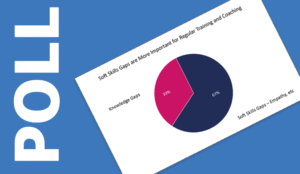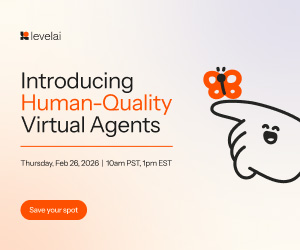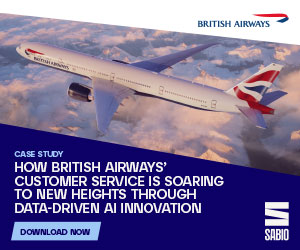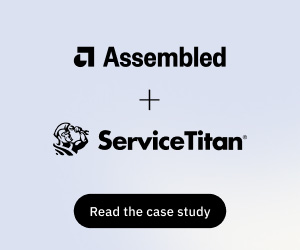Regular training and coaching ensures that contact centre staff are able to perform effectively in their roles.
Tania Kotliarova asked our LinkedIn Community “What do you think is more important in regular training and coaching?”
438 professionals responded to the poll as follows:
| Training Focus | Response % |
|---|---|
| Knowledge Gaps | 33% |
| Soft Skills Gaps – Empathy, etc | 67% |
Training and coaching focused on soft skills gaps was the clear preference, with 67% of respondents selecting this option.
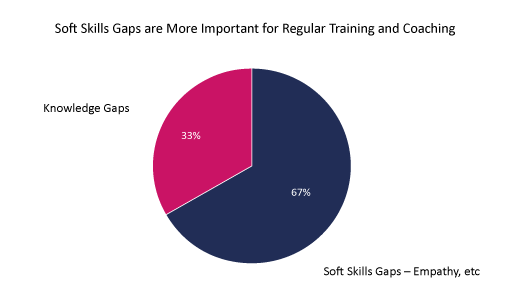
This suggests that businesses are focusing on the quality of service and the experience they provide to the customer, rather than just ensuring the employees have the right knowledge.
In response to the poll, several professionals also provided great suggestions and insights:
Customers Are Looking for Two Things
With the rise of chatbots and AI IVR, customers who press every single button on their phone in the hope of finally reaching a CSR (customer service representative) are looking for:
- fast first-time resolution
- empathy – someone who is able to listen and understand the emotions of that person, which is predominantly a soft skill
Regular training to a group of CSRs does not help enough to enhance the quality of the interaction unless an automated analysis tool is being used to grasp all the emotions, keywords etc conveyed. This way, every CSR will know what can be improved, on a real-time basis. This beats the Forgetting Curve.
Contributed by: Thibaut
It’s Important How Knowledge Is Applied
I’m surprised we’re still talking about knowledge gaps. Knowledge can be learnt by rote without fully understanding what that means in the workplace.
It’s the understanding of the knowledge and how that’s applied in everyday scenarios that’s important. That and empathy!
Contributed by: Martin
Knowledge Gaps
Often leaders think a knowledge base or IVR routing can solve their issue. The true issue is when products, policy or processes change, and the communication of such is challenging to convey in a contact centre environment.
Short huddles and team meetings rarely do enough. Harping on about soft skills is beating a dead horse. It’s the product, policy or process knowledge that is missing to staff.
Contributed by: Genese
Both Are Important in Healthcare
Both are important in healthcare because the human touch, caring and knowledge go hand in hand. Knowledge can grow, empathy has to come from the heart.
Contributed by: Nereida
Soft Skills Go a Long Way
Both are important, but I think soft skills go a long way to having an overall positive customer experience.
Soft skills are also harder to coach.
Anyone can pick up the knowledge, which often occurs naturally over time; soft skills, however, take longer to obtain. You either have them or you don’t.
Coaching those who don’t have soft skills ingrained is a constant challenge but worth the effort if you can get them across the line. Customers will thank you!
Contributed by: Angela
Definitely Empathy
Definitely empathy. Knowledge gaps can be supported by a sound knowledge base.
Contributed by: Helen
Maybe Soft Skills Wins
I chose soft skills to be more important. However, I don’t think one is more important than the other.
From my experience, many people have strong knowledge grounding in their respective roles. They would be regarded as being very good at their respective jobs. However, I often find soft skills to be lacking.
On the other hand, having someone on a team with a less than ideal level of knowledge or skill for the role can be detrimental too. It’s not fair on the rest of the team who normally achieve and exceed KPIs. It’s a bit of a morale kicker, if you ask me.
Contributed by: Graeme C.
What Makes an Interaction Stand Out Is the Human Aspect of It
This is a very interesting question. Honestly could not select one of the answers but I’ve found that what makes an interaction stand out is the human aspect of it.
I’ve coached people who had the knowledge and lacked the human touch. It is much harder to explain that while they gave the right answer, they did not show concern for the customer and the experience suffered.
Of course, customers want the right answers, but when customers are frustrated, a right answer alone may not be enough to give them the warm and fuzzies.
Contributed by: Marc
A Balance Is Required
In some cases, a person with precise technical knowledge and all the right answers is often just reciting from the book. Which can be problematic in more than one way, primarily when they can’t change their approach according to the situation.
What any industry needs is people with the right knowledge / skills coupled with a good bedside manner.
Nobody would be happy with a doctor who bluntly informed you that the cause of your illness is ‘you are fat’ or that ‘we’ll just have to chop the limb’. There is very much a level of humanness required.
I guess, like with all things in life, a balance is required. Which brings to light a key skill. The skill of achieving that balance.
Contributed by: Graeme C.
Soft Skill Gaps Are Harder to Fix
Knowledge gaps of individual agents can be fixed by a clever routing engine to move tasks to agents who can handle them.
Soft skill gaps, such as a lack of empathy or the ability to apply common sense, are much harder to sort out, in my opinion.
Contributed by: Astrid
Both Are Valid
Both are valid, in my opinion. As a business, you train the necessary skill and product knowledge, but having effective call centre emotional intelligence is key, and identifying this early in training helps you with the right fit.
In the end, customer service is a human interaction and customers are frustrated for many reasons, some being that their demand isn’t being met and the agent handling this is not equipped to deal with it.
This will help to reduce attrition and will help develop quality staff too. This focus can bridge many gaps, which I think is an underlying issue, so it can improve both points.
Contributed by: Zain
Greater Knowledge Creates More Efficient Agents
I chose knowledge gaps.
It’s nice to speak to someone who has the most amazing soft skills and can really engage with you as a customer, but let’s face it, at the end of the day, it doesn’t matter how nice the agent is, if they have a knowledge gap that means they can’t conclude my enquiry, then that’s an issue.
Does that knowledge gap mean there are extra steps to take in the process? Do they have to involve someone else? That’s just time, effort, and cost.
Greater knowledge creates more efficient agents, which in the end should reduce call time and present the opportunity for first call resolution.
Contributed by: Adam
Both Are Equally Important
Both subjects are equally important and should be included in your regular training based on your company’s needs.
My advice is to first asses the needs of the trainees and deploy training only with a clear objective in mind.
This will allow you to deliver group personalized training where the team needs it the most – thus you will also be able to see improvement in results and in most cases employee engagement going up (as they receive what they need, not what’s on the menu).
Contributed by: Emil
I Couldn’t Answer
Sorry I couldn’t answer the above, but I thought I would share another opinion. As leaders, we should be focused on the creation of value to consumers in ways that matter to them.
We first need to understand how and how well we are doing this today, and then study why only so well, and typically the only way to do this is getting into the work where customers are interacting with us, understanding the value demands they place on us, and the failure demand created by our failure to do something or do something right as per the original value demand and what matters.
Studying our systems outside-in from a customer’s point of view might challenge our assumptions and beliefs about what is really going on and identify real levers for substantial change.
Contributed by: Ali
Source: Poll conducted in our LinkedIn Community Sample size – 438 Date: 2022
Author: Robyn Coppell
Reviewed by: Jo Robinson
Published On: 23rd Sep 2022 - Last modified: 16th Jan 2026
Read more about - Contact Centre Research, Research, Soft Skills, Training and Coaching





